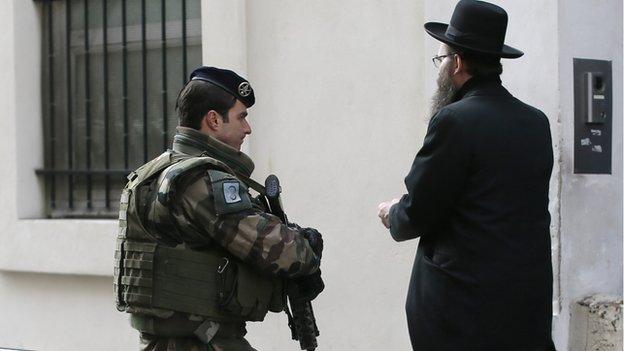French Jews increasingly question their future
- Published
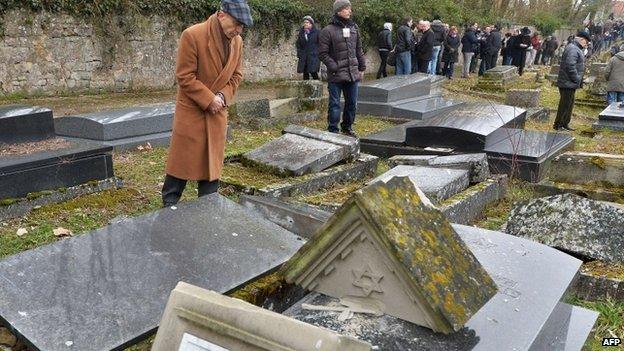
Tombstones were vandalised in a Jewish cemetery last month
"From your holy dwelling-place, look with kindness on this our country, the French Republic. And bless the French people. Amen."
Every Saturday in synagogues across France these words are intoned - in French or in Hebrew - as part of the Shabbat service.
The Prayer for the French Republic goes back to 1808, when the Jewish community was formally recognised by Napoleon as one of France's three official religions.
It enshrines in holy language the special debt that French Jews have always felt to France, as the first country in Europe in which they were proclaimed full citizens.
Today that special link is once again under terrible strain, as more and more French Jews question where their future lies.
Anti-Semitism has rich roots in France.
Twice in little over a century - first in the Dreyfus affair, external (when a Jewish officer was wrongly accused of treason) and then under Vichy in World War Two - Jews have been victims of a national quest for ideological or ethnic purity.
Today anti-Jewishness is back, but in a different guise. And many Jews feel betrayed by the slowness of the French response.
They feel that for more than a decade the source of most anti-Jewish violence has been deliberately masked in order not to antagonise French Muslims.
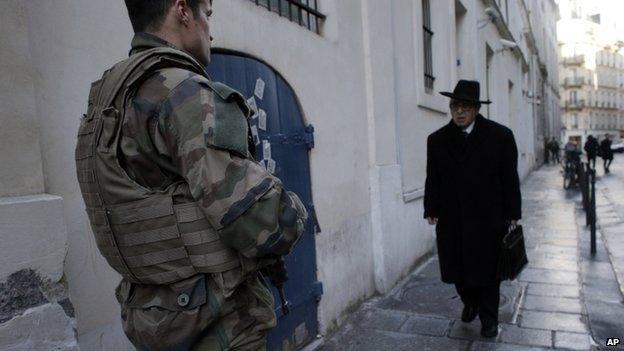
Jewish sites received military protection after the January attacks
Instead of saying explicitly that the new anti-Semitism came from elements in the Muslim community, it was more expedient for politicians and journalists to lump it all together as part of a historical phenomenon for which the whole of France could be held responsible. So goes the argument.
Thus when Mohamed Merah began his murder spree in Toulouse in 2012, the theory that it was a far-rightist who was killing soldiers was nurtured in the media far longer than was plausible.
"We have been saying this for years, and only now have people begun to listen: the danger to Jews here no longer comes from the far-right," says Michel Zerbib, editor-in-chief at the Jewish radio station RadioJ.
Old prejudices
Vestiges of old European anti-Semitism remain.
Last month, former Socialist foreign minister Roland Dumas used language straight from the 1930s, external when he said that Prime Minister Manuel Valls was probably "under the influence" of his Jewish wife.
And the recent vandalism at a Jewish cemetery in Alsace was the work of local yobs, with some inarticulate folk-memory giving edge to their teenage destructive urges.

Jews in France:
France has a Jewish population of 600,000. It is the third largest community after Israel and the United States.
The number of Muslims in France is estimated at around 6,000,000.
Most French Jews are Sephardi Jews whose families emigrated from North Africa when Algeria, Tunisia and Morocco won independence.
In 2014 more than 7,000 French Jews emigrated to Israel. For the first time France led the table of countries contributing to aliyah.
The Representative Council of Jewish Institutions in France (CRIF) reported 851 anti-Semitic acts in 2014, up from 423 in 2013.

But after the attacks in Paris and Copenhagen, obfuscation is no longer an option. The real threat to Jews - the mortal threat - is the Islamist one.
Many French Jews hope that the outpouring of national unity that followed the January attacks at Charlie-Hebdo and Hyper Cacher will now act as a bulwark.
"The legacy of these terrible events could be to end the feeling of solitude among French Jews," says Sacha Reingewitz, head of the Union of Jewish Students.
"Up till now the political and national mobilisation against anti-Semitic violence has been very weak. No way would there have been so many people demonstrating on 11 January, had the Jewish supermarket been the only target of the attacks."
Today the French state is indeed mobilised like never before in defence of the Jewish community, with hard-hitting pronouncements from President Hollande and soldiers posted at Jewish schools, community centres and places of worship.
For some Jews, it is still not enough. Last year saw a big increase in the numbers emigrating to Israel - more than 7,000 - and 2015 will probably see the trend continue.
"Today it is an act of heroism just to wear a kippah on the street or to send your children to a Jewish school. This in Paris in the 21st Century! It really hurts," says Paris rabbi Mikael Journo.
Growing insecurity
According to Roger Cukierman, who heads the Representative Council of Jewish Institutions in France (CRIF), the increase in aliyah from France is directly attributable to the growing insecurity.
"Jews have had the feeling they are the pariahs of the nation," he says.
In Jewish households across the country, there has been the same conversation. It is one that Jews have had many times in history. How to react to the violence? Is it safe? Should we leave?
But just as it is undeniable that more French Jews today are susceptible to the call to emigrate, it is equally true that the vast majority are not.
Many Jewish leaders - especially those of a left-wing tendency - are angry with Israel's prime minister Benjamin Netanyahu for (as they see it) playing up their insecurity and implying that France cannot protect them.
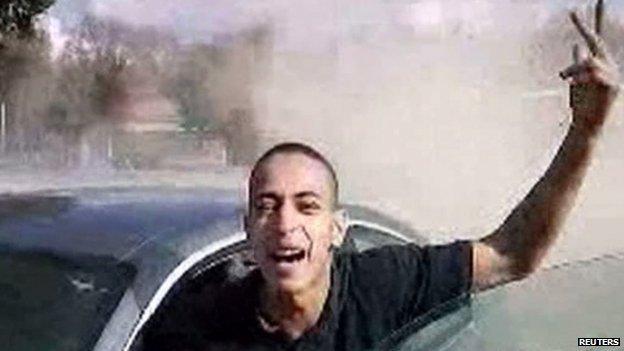
Mohamed Merah murdered seven people in south-west France
They also accuse him of cynically encouraging the notion of their dual allegiance (to France and to Israel) - even though he knows this feeds into anti-Semitism.
Like Jews everywhere, French Jews do feel a strong attachment to Israel.
But they also have a strong attachment to France - and the vast majority have no intention of leaving.
In the vandalised Jewish cemetery at Sarre-Union in Alsace, one of the grave-stones that was overturned was nearly two centuries old.
It belonged to a Jewish "grognard", one of the die-hard soldiers who followed Napoleon through his European campaigns.
"That says it all," says Alain Jakobowitz, Jewish head of the anti-racist group LICRA.
"Jews have a future here, because they have a past."
- Published16 February 2015
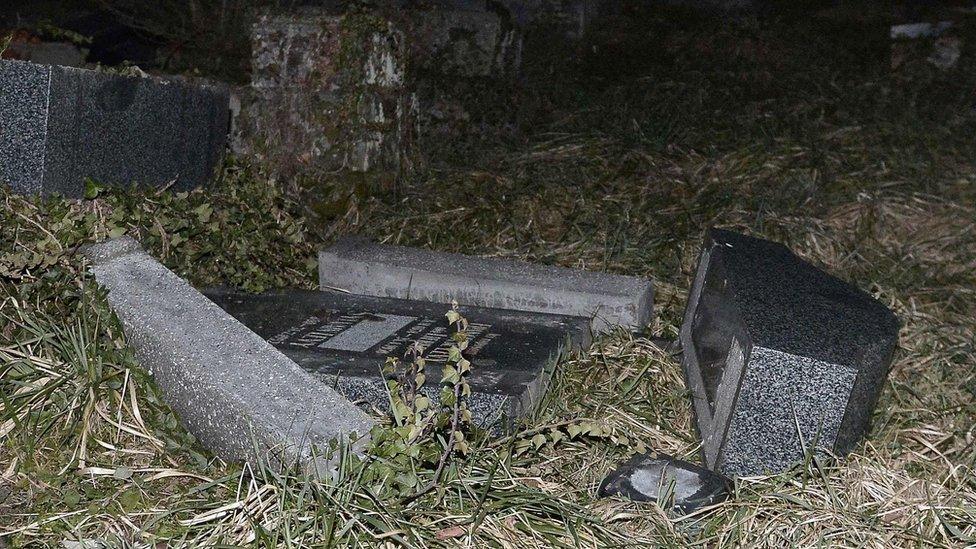
- Published13 January 2015
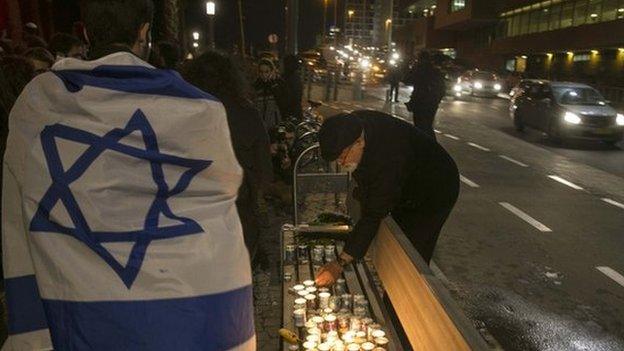
- Published22 January 2015
